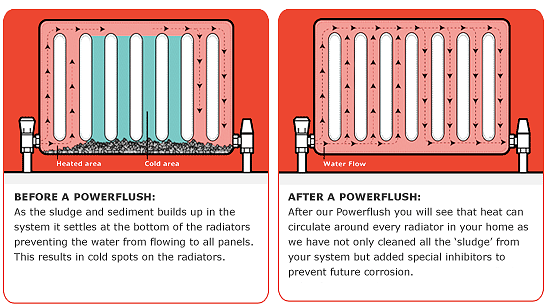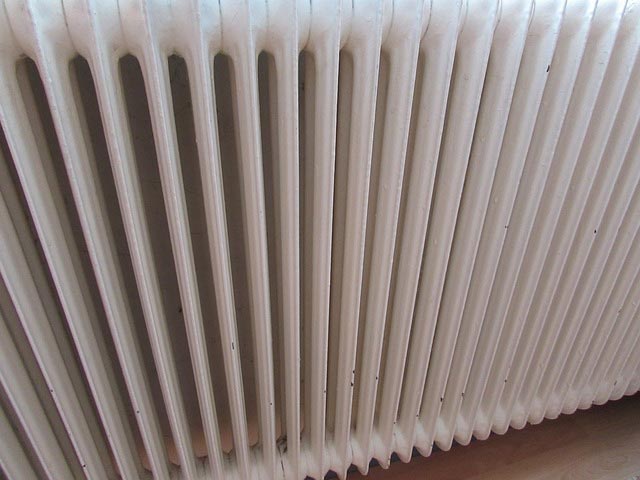Your property’s central heating system is integral to keeping the lives of its occupants comfortable.
A reliable supply of constant heat and hot water is vital, especially when the temperature drops—the very reason why you need to keep your system in top shape. Once the cold weather rolls in, you would not want to deal with a faulty heating system.
This is where power flushing comes in.
With constant use, your central heating system is bound to accumulate a slew of contaminants, such as sludge, rust, scale, and other kinds of debris. Power flushing removes these from your radiators, boilers, and pipes, effectively decreasing the risk of breakdown and leaks.
On top of this, UK Building Regulations also require both domestic and non-domestic establishments to properly maintain their central heating systems.
What Are The Signs That You Need Power Flushing?
When your heating system forms a buildup of oxide sludge and calcium, it can cause your radiators and heat exchangers to corrode. This happens when an undetected problem lets air get inside the system.
This accumulation of contaminants would block waterways in your radiators, pipes, and heat exchangers. These blockages would then reduce the effectiveness of your system, slowing down the transfer of heat.
Without power flushing, your heating system is now vulnerable to damage. To find out if you need power flushing, see if your system displays any of these symptoms:
- Radiators get cold spots (especially at the bottom)
- Radiators do not get hot even after the pipe does
- Radiators take a long time to heat up
- Radiators need frequent bleeding, producing discoloured water
- Radiators have leaks
- Radiators and boilers become noisy, making loud banging or knocking sounds
- Boilers switch on and off (also called “cycling”)
- Boilers produce unstable temperature, especially in the case of combination boilers
- Boilers breakdown
- Boilers can sometimes make noises that resemble that of a whistling kettle

Consequences of Not Power Flushing
Plenty of property owners think that power flushing is an unnecessary expense. Some would opt to drain their heating systems, without realising that there are big clumps of sludge inside.
While draining can remove some of the light debris away, there would still be a lot of those left inside. Remember, a clean running water does not always indicate a clean heating system.
Without power flushing, your system would:
- Remain inefficient, costing you more money in fuel and future repairs
- Lead to eventual mechanical failure (e.g. motorised valves, hydraulic systems, etc)
- Form pin holes in radiators and heat exchangers
- Leak and spill oxide sludge, damaging your carpets and flooring
If you let the problem get out of hand, power flushing will not be able to solve it anymore. Depending on the amount of damage, you may be better off replacing it.

Who Can You Trust To Do Power Flushing?
Plenty of sources on the internet can teach DIY power flushing. Do note, however, that you are going to take a huge risk if you are not a professional plumber.
It would be in your best interest to hire a professional team of plumbers for a number of reasons:
- Less risk. Without proper knowledge, you can damage your entire system, wasting your time and money in the process. These specialists are trained to handle chemicals and equipment without risk of bursting pipes and other parts.
- Ensure the validity of your insurance. DIY power flushing would not give you a “power flush certificate” in the end—a requirement needed by most insurance companies that cover repairs and maintenance on central heating systems. Without that certification, insurance might not cover any future work needed.
- Proactive maintenance. Apart from power flushing, a plumber would also be able to properly diagnose other problems your heating system has. If there is an underlying issue that allows air to get into the pipes, a plumber would be able to pinpoint this and rectify it. Without proper diagnosis, this problem could stay undetected and eventually get worse.
When hiring professionals, always research them on independent review sites. If not displayed on their website, you can request for customer recommendations.
Lastly, before allowing anyone to do any work, always ask for IDs and certifications (e.g. CSCS plumbing card, gas safety card, etc).
How Is Power Flushing Done?
Power flushing requires two main components—a machine that would be connected to your central heating system and a chemically-treated water that would flush your system of any dislodged debris or rust.
The process usually follows these steps:
- A plumber would hook up a pump to your heating system. Depending on the type that you have, it would be connected to the circulation pump (boiler system) or the pump head (combination system).
- The pump will send chemically-treated water into your pipes, radiators, and boilers at high velocity.
- This chemical contains sludge and rust remover, as well as a descaler in case there is limescale present. There would also be corrosion inhibitor in the mix to prevent rust in the future.
- Some tools may be needed to dislodge stubborn debris on a radiator’s exterior.
- The plumber would then measure your radiator’s temperature and show you how much the heating has improved.
The entire process could take half a day (about six to ten hours). If you have multiple radiators or an old system, it could take longer. If the plumber sees more problems (e.g. parts that need replacing), power flushing may need more than a day.
Ideal Frequency of Power Flushing
The frequency depends largely on the type of system that you have. Boiler systems, for instance, use copper rather than stainless steel heat exchanges which would make it rust faster.
It is ideal to have a professional servicing every year. If you do this, a preventative power flushing would then be needed only every five to six years.
The Benefits Of System Cleansing
Power flushing proves to be beneficial in a number of ways:
- Effective heating system. You will no longer have problems with uneven heat distribution in the building or household. Radiators would heat up quicker, giving you the amount of heat that you actually want. You will also notice a much quieter boiler and radiator.
- Lower power and fuel bills. A central heating system that runs properly is more efficient with heat distribution, thereby lowering your costs for fuel and saving you money with energy bills.
- Reduce your property’s carbon footprint. Not only would you be reducing your energy usage, a heating a system that efficiently runs also reduces your business’ or home’s carbon footprint.
- More reliable. You can rest assured that your system will not break down, especially during the cold months of winter.
- Prolonged life. It may be expensive to maintain a heating system, but it would be even more expensive to replace one. If your boilers and radiators are in good shape, you would extend the life of the entire system. A professional plumber would also repair any minor issue they see, lessening the risk of future malfunctions.
- Staying legal. Business owners are legally obligated to make sure all gas, LPG, and oil appliances comply with state laws. Gas Safe certifications are needed to inform the government (and your employees) that your property is safe for operation. Check out The Health & Safety at Work Act (1974), Workplace (Health, Safety & Welfare) Regulations 1992, and the Gas Safety (Installation and Use) Regulations 1998 for your legal obligations.
Power flushing your central heating system may prove to be expensive. However, if you calculate the money that you would need to fix broken parts or, worst case scenario, replace them, regular power flushing would actually be more cost efficient.
This all depends on how much your system is affected. If all of its components show two or more of the symptoms detailed above, then power flushing would be the better option. Consulting and working with a professional heating engineer would help take the guesswork out of this.


